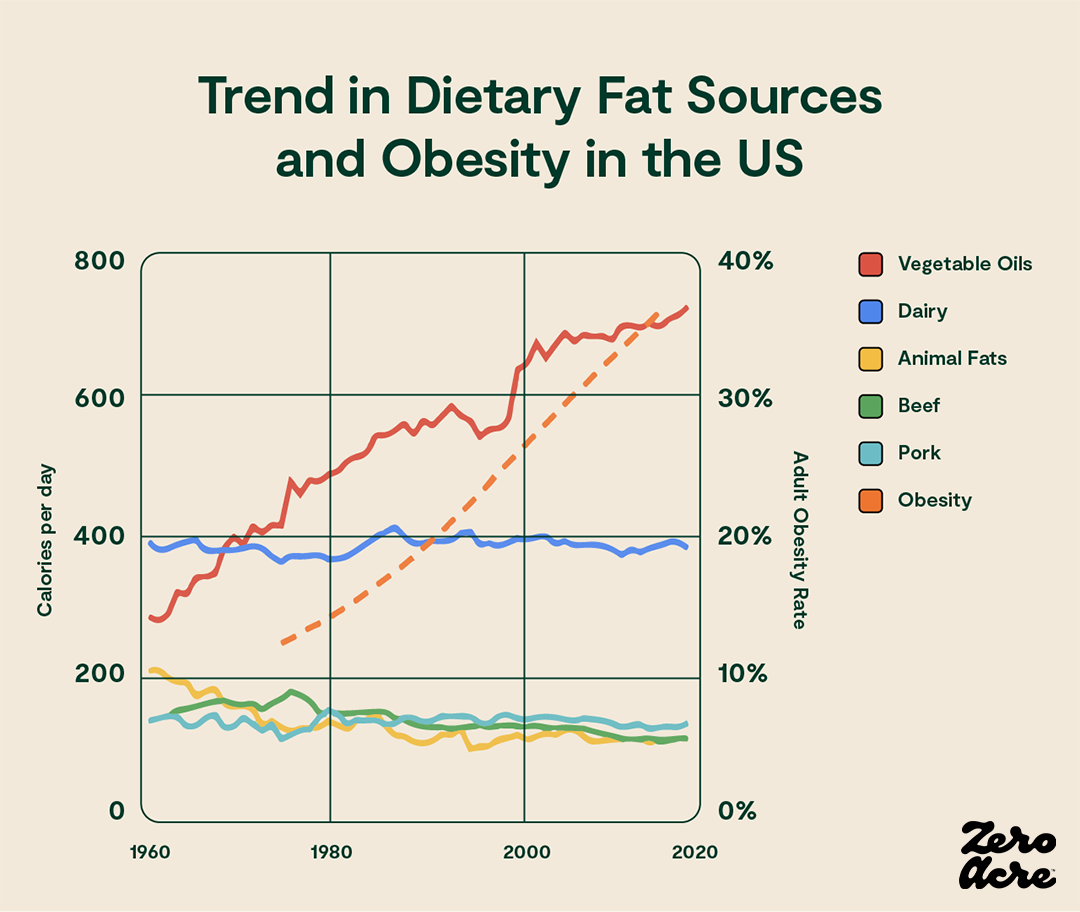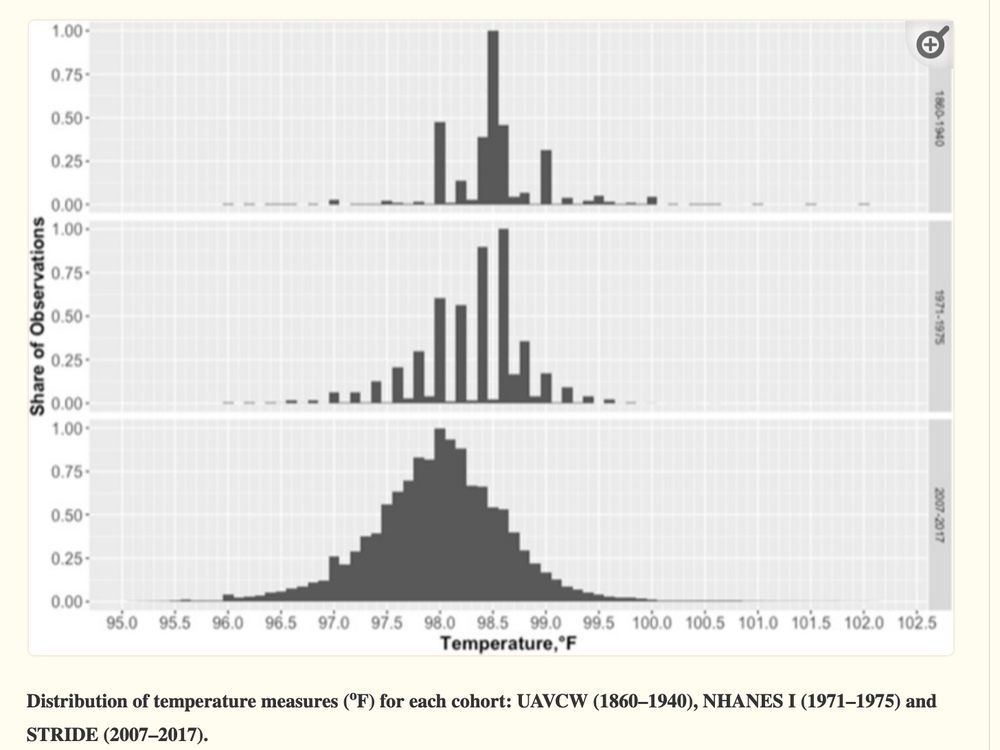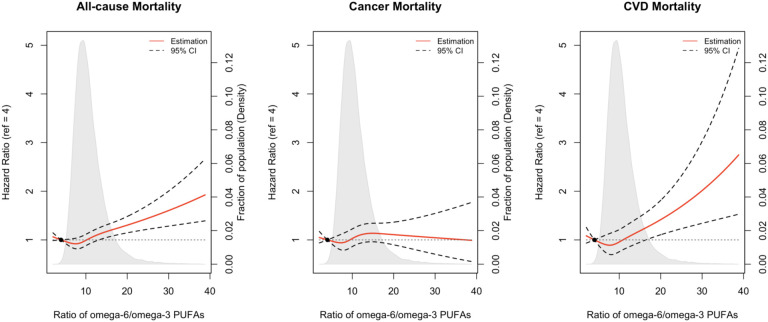Murph
:)
- Messages
- 1,799
My main health-science interest is ME/CFS obviously but i've recently been reading more about obesity. There's an intriguing possible connection.
Obesity has risen at the same time people have been eating more polyunsatured fats via seed oils (e.g. sunflower oil and canola oil and all the things in fried and processed foods), as this chart shows:

Seed oils are high in omega 6. Science is pretty sure that the ratio of omega 3 to omega 6 in your body is very important.
"Excessive amounts of omega-6 polyunsaturated fatty acids (PUFA) and a very high omega-6/omega-3 ratio, as is found in today's Western diets, promote the pathogenesis of many diseases, including cardiovascular disease, cancer, and inflammatory and autoimmune diseases, whereas increased levels of omega-3 PUFA (a low omega-6/omega-3 ratio) exert suppressive effects." source; https://pubmed.ncbi.nlm.nih.gov/12442909/
There's an interesting effect of high omega 6: it makes you fat and tired and in certain animals it can even trigger hibernation. Bears eat loads of omega-6 rich nuts and when they eat enough, their body can start to hibernate. Same is true of other animals that do torpor (short term) and hibernation (long term).
Source: https://faseb.onlinelibrary.wiley.com/doi/abs/10.1096/fasebj.2019.33.1_supplement.lb304
People are not known to hibernate. Nor are we known to enter torpor. However the skill is found in all branches of the animal tree, including mammals and even one or two primates (they call this "evolutionarily conserved"). So it's possible we have some parts of the biolgical machinery in there and we're mostly not using it when we are healthy. (nb many of us attest to a time of year effect!)
Body temperatures have fallen over the last 100 years - as the next picture shows - as seed oil intake has risen. Could some people be in a pseudo-torpor? Could mecfs be partly affected by propensity to torpor ? are all the omega 6 polyunsatured fats on our bodies part of what's making the overall population sicker and us acutely sick?

One weird little clue that I sometimes turn over in my mind is that Norway and Britain are the two epicentres of mecfs (as shown below via google trends). What is it about the geography of the region that might explain it? I've though about sunlight and vasodilation usually. But one answer may be that these regions are historically fishy, eating cold water fish. [i'm stretching the idea now, no argument!] fish are high in omega 3. Is it possible that northern europeans need even more omega 3 than they are getting from a modern diet, and are more prone to torpor if they have high omega-6 to omega 3 ratios (and especially if they then get whacked by a virus?)

Certainly omega-3 supplementation is a very very safe idea. well tested. I'm also going to radically reduce omega-6 just to see if I notice anything different! maybe i just lose a bit of fat, that would be welcome too!
Obesity has risen at the same time people have been eating more polyunsatured fats via seed oils (e.g. sunflower oil and canola oil and all the things in fried and processed foods), as this chart shows:

Seed oils are high in omega 6. Science is pretty sure that the ratio of omega 3 to omega 6 in your body is very important.
"Excessive amounts of omega-6 polyunsaturated fatty acids (PUFA) and a very high omega-6/omega-3 ratio, as is found in today's Western diets, promote the pathogenesis of many diseases, including cardiovascular disease, cancer, and inflammatory and autoimmune diseases, whereas increased levels of omega-3 PUFA (a low omega-6/omega-3 ratio) exert suppressive effects." source; https://pubmed.ncbi.nlm.nih.gov/12442909/
There's an interesting effect of high omega 6: it makes you fat and tired and in certain animals it can even trigger hibernation. Bears eat loads of omega-6 rich nuts and when they eat enough, their body can start to hibernate. Same is true of other animals that do torpor (short term) and hibernation (long term).
Source: https://faseb.onlinelibrary.wiley.com/doi/abs/10.1096/fasebj.2019.33.1_supplement.lb304
People are not known to hibernate. Nor are we known to enter torpor. However the skill is found in all branches of the animal tree, including mammals and even one or two primates (they call this "evolutionarily conserved"). So it's possible we have some parts of the biolgical machinery in there and we're mostly not using it when we are healthy. (nb many of us attest to a time of year effect!)
Body temperatures have fallen over the last 100 years - as the next picture shows - as seed oil intake has risen. Could some people be in a pseudo-torpor? Could mecfs be partly affected by propensity to torpor ? are all the omega 6 polyunsatured fats on our bodies part of what's making the overall population sicker and us acutely sick?
One weird little clue that I sometimes turn over in my mind is that Norway and Britain are the two epicentres of mecfs (as shown below via google trends). What is it about the geography of the region that might explain it? I've though about sunlight and vasodilation usually. But one answer may be that these regions are historically fishy, eating cold water fish. [i'm stretching the idea now, no argument!] fish are high in omega 3. Is it possible that northern europeans need even more omega 3 than they are getting from a modern diet, and are more prone to torpor if they have high omega-6 to omega 3 ratios (and especially if they then get whacked by a virus?)
Certainly omega-3 supplementation is a very very safe idea. well tested. I'm also going to radically reduce omega-6 just to see if I notice anything different! maybe i just lose a bit of fat, that would be welcome too!

